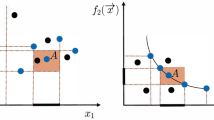Abstract
Solving the multi-objective optimization (MOO) problem with maintaining a good exploration and a uniform distribution is crucial. In this paper, we propose a novel selection criterion for maintaining efficient exploration and uniform distribution for the solution. In the proposed strategy, angular sectors of the solutions are used to preserve and maintain a good non-dominated solution in the searching space in all possible directions equally. Concerning the evaluation, we replace the crowding distance into the NSGA-II by our proposed criterion that named as angular sectors, and the resulting NSGA-II-AS algorithm was compared with NSGA-III according to the function which is widely used in the literature. The results show that NSGA-II-AS outperforms NSGA-III.
Access this chapter
Tax calculation will be finalised at checkout
Purchases are for personal use only
Similar content being viewed by others
References
Metiaf, A., Elkazzaz, F., Qian Hong, W., Abozied, M.: Multi-objective optimization of supply chain problem based NSGA-II-Cuckoo Search Algorithm. In: IOP Conference Series: Materials Science and Engineering, vol. 435, p. 012030 (2018)
Mukhopadhyay, A., Member, S., Maulik, U., Member, S.: A survey of multiobjective evolutionary algorithms for data mining: part I. 18(1), 4–19 (2014)
Zitzler, E., Laumanns, M., Bleuler, S.: A tutorial on evolutionary multiobjective optimization, vol. 535 (2004)
Coello, C.A.C., Pulido, G.T., Lechuga, M.S., Clerc, M.: Handling multiple objectives with particle swarm optimization. IEEE Trans. Evol. Comput. 8 (2004)
Li, H., Zhang, Q.: Multiobjective optimization problems with complicated Pareto sets, MOEA/D and NSGA-II. IEEE Trans. Evol. Comput. 13(2), 284–302 (2009)
Xing, L.N., Chen, Y.W., Yang, K.W.: An efficient search method for multi-objective flexible job shop scheduling problems. J. Intell. Manuf. 20(3), 283–293 (2009)
Cheng, R., Jin, Y., Olhofer, M., Sendhoff, B., Member, S.: A reference vector guided evolutionary algorithm for many-objective optimization 20(5), 773–791 (2016)
Deb, K., Pratap, A., Agarwal, S., Meyarivan, T.: A fast and elitist multiobjective genetic algorithm: NSGA-II. IEEE Trans. Evol. Comput. 6 (2002)
Yang, L., Guan, Y., Sheng, W.: A novel dynamic crowding distance based diversity maintenance strategy for MOEAs. In: 2017 International Conference on Machine Learning and Cybernetics, pp. 211–216 (2017)
Sun, C.: An improved differential evolution and novel crowding distance metric for multi-objective optimization. In: 2010 Third International Symposium on Knowledge Acquisition and Modeling, no. x, pp. 265–268 (2010)
Harada, T., Kaidan, M., Thawonmas, R.: Crowding distance based promising solution selection in surrogate assisted asynchronous multi-objective evolutionary algorithm. In: Proceedings of the Genetic and Evolutionary Computation Conference Companion—GECCO’18, no. 1, pp. 253–254 (2018)
Liu, Z.Z., Wang, Y., Huang, P.Q.: A many-objective evolutionary algorithm with angle-based selection and shift-based density estimation. Inf. Sci. (Ny). 1–16 (2017)
Xiang, Y., Zhou, Y., Li, M., Chen, Z.: A Vector angle-based evolutionary algorithm for unconstrained many-objective optimization. IEEE Trans. Evol. Comput. 21(1), 131–152 (2017)
Li, M., Yang, S., Liu, X.: Shift-based density estimation for Pareto-based algorithms in many-objective optimization. IEEE Trans. Evol. Comput. 18(3), 348–365 (2014)
Bi, X., Wang, C.: A niche-elimination operation based NSGA-III algorithm for many-objective optimization. Appl. Intell. 48(1), 118–141 (2017)
Deb, K., Jain, H.: An evolutionary many-objective optimization algorithm using reference-point based non-dominated sorting approach, part i: solving problems with box constraints. Ieeexplore.Ieee.Org 18(c), 1–1 (2014)
Zitzler, E., Thiele, L.: Multiobjective evolutionary algorithms: a comparative case study and the strength Pareto approach. IEEE Trans. Evol. Comput. 3(4), 257–271 (1999)
Acknowledgements
The authors thank the anonymous reviewers and the editors of this conference sincerely for their future helpful observations and detailed recommendations that will help in increasing the quality of this paper.
Author information
Authors and Affiliations
Corresponding author
Editor information
Editors and Affiliations
Rights and permissions
Copyright information
© 2020 Springer Nature Singapore Pte Ltd.
About this paper
Cite this paper
Metiaf, A., Wu, Q. (2020). A Novel Selection Criterion Based on Diversity Preservation for Non-dominated Solutions. In: Jain, V., Patnaik, S., Popențiu Vlădicescu, F., Sethi, I. (eds) Recent Trends in Intelligent Computing, Communication and Devices. Advances in Intelligent Systems and Computing, vol 1006. Springer, Singapore. https://doi.org/10.1007/978-981-13-9406-5_52
Download citation
DOI: https://doi.org/10.1007/978-981-13-9406-5_52
Published:
Publisher Name: Springer, Singapore
Print ISBN: 978-981-13-9405-8
Online ISBN: 978-981-13-9406-5
eBook Packages: Intelligent Technologies and RoboticsIntelligent Technologies and Robotics (R0)




